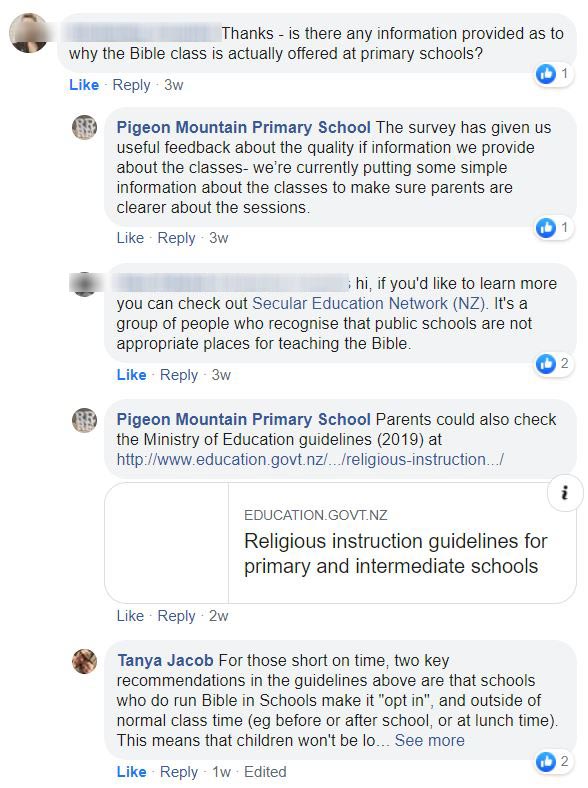
 With the 2019 release of guidelines for religious instruction classes from the Ministry of Education, more and more schools are reviewing their procedures for religious instruction. One of these schools is Pigeon Mountain Primary School (Auckland).
With the 2019 release of guidelines for religious instruction classes from the Ministry of Education, more and more schools are reviewing their procedures for religious instruction. One of these schools is Pigeon Mountain Primary School (Auckland).
While it is admirable that schools are seeking feedback from parents and involving them in the decision-making process, what is consistently missing from virtually all school surveys is any questions regarding why religious faith is being promoted to children in a non-religious state school! As you can see below, a parent with children at Pigeon Mountain Primary School asks this very question in relation to the release of survey results. The response from the school is to ignore the question and answer with a response to a question that was not asked!
Tanya Jacob from the Secular Education Network also commented, pointing out that the MOE are recommending that schools change to opt-in and run religious instruction outside normal class time. While still against the spirit of secular education that is welcoming to all, this would at least reduce the degree to which children are coerced into bible classes. No response to this either.

They’ve missed the point!
The really astounding thing about the Pigeon Mountain Primary School Survey comments (see below) was that the parents responded to questions about how well informed they were about the classes with an overwhelming answer of “you didn’t explain anything to us”. One has to wonder why 75% of parents at the school are putting their children in classes that they have little understanding of?
The worst thing is that a number of parents seem to think that the classes were teaching about different religions and not just teaching their kids that Christian faith is true. Let’s make something clear. Bible in Schools exists to promote belief in a Christian God, belief that Jesus is his son, that the earth was created in 7 days, that the Bible is the source of knowledge about God and that children should pray to God. This is in no way an academic class.
Pigeon Mountain Schools response to this widespread misunderstanding is not to question the validity of promoting Christian religious faith instead of teaching children facts about religion. Their response is to say that they will provide more information sourced from the very people who are promoting the classes! That’s like asking the McDonald’s marketing department to provide some information about a class on nutrition, taught by McDonald’s staff! It is that absurd.
Pigeon Mountain Bible In Schools Survey Comments
We would like to thank the respondents who participated in the fourth Principal’s Email Group of 2019. There were a series of questions based on whether children attend Bible in Schools classes or not;
ALL respondents were asked for their opinion/ experiences about how the Bible in Schools Programme was explained at enrolment.
- I don’t recall really having any explanation of it.
- I am happy enough with it being taught, whilst not religious ourselves there are lots of positive messages around religion and the morals etc it teaches.
- On the question below I would have ticked “Don’t know” if that was there as an option.
- It wasn’t explained to me.
- Can be improved
- It wasn’t
- Was not explained to me at either of my 2 kids’ enrolment. I think there was a form at some point that i signed
- Good
- We didn’t really get an explanation of what this was, just a for to opt out
- I can’t recall the programme being explained to me at enrolment!
- Never heard of this programme.
- Culturally appropriate way with more information, e.g. via Wechat
- I don’t remember it being explained at all and for a while there (until the kids told me about it) I had one child attending Bible Class and the other didnt.
- No one explained, and I just followed the enrolment form.
- It was not explained.
- I don’t remember being explained to me.
- I would say there was not enough explanation. I was explained it was a religion leaning, so I thought the students would learn general ideas of different religions. It should have been specifically mentioned that it would be a Catholic preaching.
- I didn’t know the Bible in Schools Programme
75% of respondents said their children DID attend classes- their questions are below
- No opinion – don’t know for certain if our daughter is participating?
- I think they are very good. My son can recount the story and the moral behind it. He is excited about the next week’s lesson.
- The bible program need to be modernized. The out-of-date style is not the kid’s favor. Party style “Music+dance+singing” is kid’s love. Go to “youtube” and search “equippers kids”, specially the perfect video “This is how we party horizon kids style” to have a taste and see how other church run the kid’s program.
- The song can be modified to reduce the religion’s color. Combine the performance into our assembly or school big event/party. Our assembly or event will be fantastic.
- Ok if it is taught in a child friendly way, and not pushy about what is right or wrong, or how the kida need to think. I am not religious but ok for my kids to learn about religious diversity. If it gets too heavy or propaganda-rish, i will pull them out.
- good
- I feel it is important that the children should know about different religions however I feel it should be up to the parents to teach their children about their religion, if they have one, or discussion regarding other religions should the matter arise, and therefore the current time spent teaching bible can be utilised in other more productive ways.
- I have little information about what the programme consists except for the information provided by my children! I was expecting something more multi cultural and multi religious focused, where different cultures and religions could be explained and approached in a simple way. I soon realised it wasn’t even close to my expectation!
- Not enough communications or feedbacks on the sessions from our school. I have limited understanding of how it goes.
- That is important to have this as an option for those parents who want their children to attend. It is not compulsory so if you dont want your child to go they dont have to. I would hate to see it taken away.
- Not really know the details, because my child (in year 1) can’t explain well now.
- Just to clarify: one attends, the other does not. I don’t know much about it, just what the kids tell me. As we are not religious (but respect and try to learn about all beliefs) I would prefer that this time would be used to discuss the different beliefs.
- I do like the kids learn the bible, for me is important the way the bible impact in kids life to do good things , to act nice, etc. but as a religion I am not sure because NZ has so many multicultural and religions from different countries…
25% of respondents said their children DID NOT attend classes- their questions are below
- I don’t actually know what provisions are made for them this hasn’t been clearly communicated
- More info. could be provided to parents about this programme.
- First of all, I feel having Bible classes at public school lacks of fairness under freedom of religion. Secondly, for those who is not attending Bible lessons loose their precious learning time at school. School can make another type of classes instead. Thirdly, it might make a dividing line between those who are attending and not attending without noticing. That is not something school should accept.
- I don’t know as I didn’t know about this programme
Our next steps;
- Review and update the information supplied to parents at enrolment or to parents enquiring about our school in order to improve our communication. This will involve obtaining a summary from the providers of the programme. It will also require Senior Management rewriting procedures for the provision of non-attending students.
The arrogance of Christian evangelism in Primary Schools
This sort of attitude by schools on promotion of religion to children is so prevalent, that I am surprised that non-religious and non-Christian parents put up with it as much as they do. Perhaps they don’t realise that they are being insulted? The school is literally telling you that your choice of religion is not good enough for your children and that they need to “close” your children’s classroom so that they may promote Christianity to them. Sure, they magnanimously allow you to opt your children out if you specifically ask permission but little Johnny will not be allowed to continue learning the school curriculum. It wouldn’t be fair if your child got ahead of the other kids while they’re being indoctrinated into Biblical beliefs.
This arrogance (people seem to hate this take on it but it is what it is) is seen quite clearly in responses to a survey on Bible in Schools put out by Amuri Area School (North Canterbury) in their Newsletter of the week ending 19th October 2018. There were only 3 questions. Here are the results…
1. Do you believe that the Bible in Schools programme should be present at Amuri Area School in any form?
- 44 said YES (64%)
- 25 said NO (36%)
2. Do you believe Bible in Schools should be OPT IN (you have to specifically request your child to attend) or OPT OUT (all children attend unless parents specifically remove them)?
- 26 said OPT IN (39%)
- 41 said OPT OUT (61%)
3. Which of the following options do you believe works best for Bible in Schools?
- 47 said SAME AS NOW (68%)
- 17 said OUTSIDE CLASS TIME (25%)
- 5 said AT NO TIME (7%)
In reviewing the survey results, the board made the following statement;
We discussed as a Board our purpose and responsibility to create policy and direction that reflects the wishes of our community regardless of our own personal beliefs one way or another.
Presumably, if a majority of the community had voted to promote a particular political party view on a weekly basis, that would also be OK because “the mob rules”?
The point is that schools are supposed to be secular and thereby welcoming to children of all religious backgrounds, not just the majority one. The fact that a group of religious zealots managed to force a loophole into law allowing religious instruction in secular state schools over 50 years ago, does not absolve a board of trustees of their responsibility to protect ALL children in the school from adult agendas, regardless of what they are.
The arrogance of Christian evangelism I mentioned stands out clearly in these survey answers. Not only do they want to push their religion into the local primary school but they also want to force your children to be included into the classes unless you specifically request that they are opted out. This is coercive, as it requires you to identify yourself as someone who objects to the promotion of Christian religious faith in the school and risk stigmatising yourself and your kids. This is reflected in many schools, such as my own kids school, where the majority of children will attend Bible in Schools classes even though nearly half of parents voted (anonymously) to remove it. Lots of parents tell me they disagree with the classes but they allow their kids to go so they “fit in”.
The ludicrous thing is that the response from Christians to complaints about religious instruction classes in schools is often something to do with “discrimination”, “religious oppression” or “freedom of speech”. It’s almost as if someone wanted to come into their church and tell their kids that god isn’t real! See what I did there?


i think ‘the mob rules’ is actually known as democracy
That is a common defence against criticism and I’ve written a blog about it. Really it’s very simple. Should one group be able to vote to discriminate against another group they disagree with? I hope your answer would be no. That’s why we have human rights.